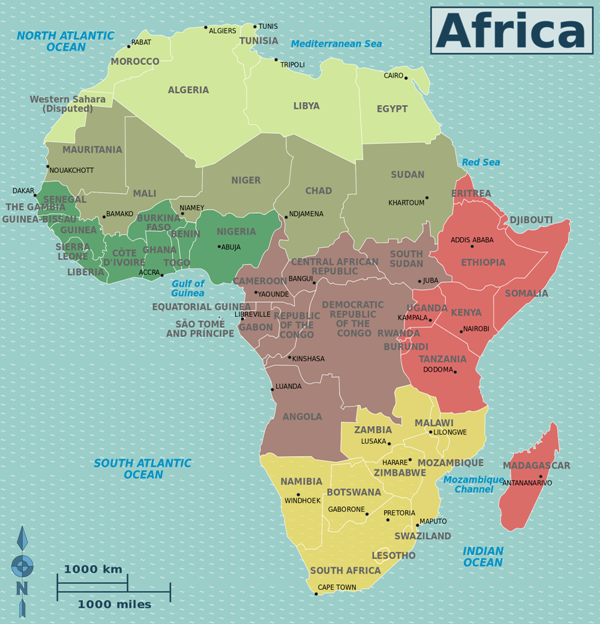Africa is the world’s second largest continent in terms of both land surface area and population after Asia with 54 countries. These countries are: Algeria, Angola, Benin, Botswana, Burkina Faso, Burundi, Cabo Verde, Cameroon, Central African Republic, Chad, Comoros, Congo Republic of the, Congo Democratic Republic of the, Cote d’Ivoire, Djibouti, Egypt, Equatorial Guinea, Eritrea, Ethiopia, Gabon, Gambia, Ghana, Guinea, Guinea-Bissau, Kenya, Lesotho, Liberia, Libya, Madagascar, Malawi, Mali, Mauritania, Mauritius, Morocco, Mozambique, Namibia, Niger, Nigeria, Rwanda, Sao Tome and Principe, Senegal, Seychelles, Sierra Leone, Somalia, South Africa, South Sudan, Sudan, Swaziland, Tanzania, Togo, Tunisia, Uganda, Zambia, Zimbabwe.
The population of Africa is 1.1 billion (2013 estimates) which is about 15% of the global human population. The countries in Africa can be classified into regions such as Northern Africa, Western Africa, Central Africa, Eastern Africa and Southern Africa. All countries in Africa are a member of the African Union (AU) except Morocco. All countries in Africa were colonized by foreign powers with exception of Liberia and Ethiopia. The language spoken by the majority of the people is Arabic followed by English.

10 Facts About Africa
- Algeria is the largest country in Africa by land surface area while Seychelles is the smallest. Seychelles is a group of islands located on Africa’s east coast. Within the mainland, The Gambia is the smallest country.
- Nigeria is Africa’s most populous country with a population of more than 170 million. South Sudan is the newest country in Africa, formed in 2011 after independence from Sudan.
- Tanzania has Africa’s highest mountain, Mount Kilimanjaro. The Serengeti in Tanzania has the largest wildlife migration in the world and is considered as one of the wonders of the world. Wildebeests and Zebras migrate from Serengeti National Park in search of greener pastures in Maasai National reserve in Kenya. This phenomenon takes place between July and October every year.
- Kenya is located in the eastern part of the continent and the first African winner of Nobel Peace Prize came from this country.
- Swaziland is an absolute monarchy ruled by a king and is one of the smallest countries in Africa.
- South Africa is the second largest economy in Nigeria and has 11 official languages and due to its multiculturalism, it is usually called the rainbow nation. Despite that, South Africa has the most reported cases of HIV with more than 6.3 million people living with HIV/AIDS.
- Gabon is smaller than the size of Colorado but 80% of Gorillas in Africa come from there.
- Malawi was previously called Nyasaland and Lake Malawi is a world heritage site because it has more fish species than any other freshwater lake fish in the world.
- Mauritius is the most densely populated country in the continent and has also a high quality of life.
- Liberia was established by citizens of US and was inhabited by mainly free African-American slaves and is one of the two countries that were never colonised by foreign powers.
Some more interesting facts about Africa
- The Nile is the longest river in the world and it is 6,650 kilometres (4, 130 miles) long traversing across 11 countries.
- Africa has the world’s youngest population with the median age being 19.7 while the world’s average is 30.4 years. (2012 estimates).
Origin of mankind and civilisation
Egyptian culture is one of the earliest in the continent and people specialised in making tools and weapons as well as building the Pyramids. In addition, Egyptians were skilled mathematicians that developed early systems in medicine and agricultural production. Benin Empire, originally in the modern day Nigeria was among the first locations in Africa to show signs of civilisations with Benin being one of the most developed cities in ancient times. Evidence of origin of humanity has been traced in Ethiopia with the oldest human fossil discovered in the country.
